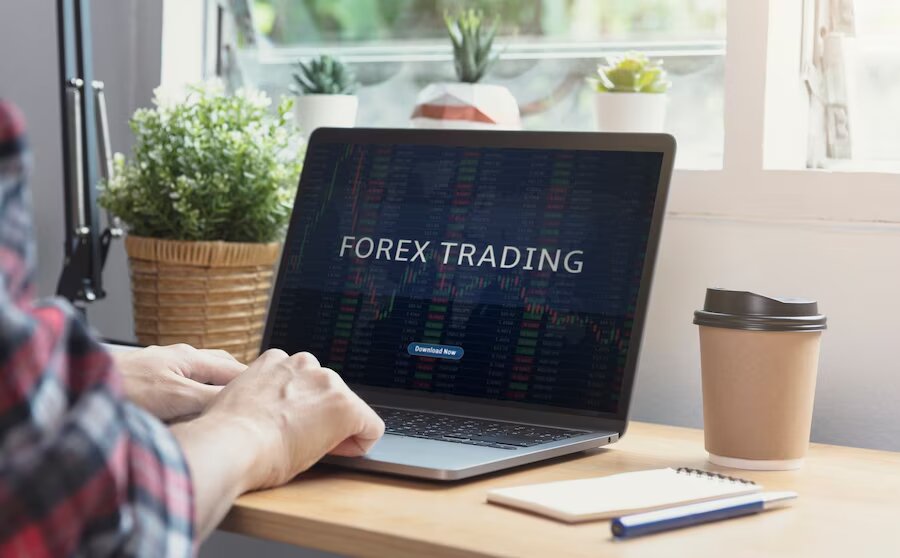A Basic Guide To Forex Trading
5 Mins Read
Published on: 26 April 2023
Last Updated on: 28 April 2023

toc impalement
Forex trading is buying and selling currencies to make a profit. With trillions of dollars worth of currency being traded daily, this one is the largest and most popular financial market in the world.
Forex traders use various methods to analyze the market and predict the direction in which currency prices will move. They then use this information for buying a currency or to make informed trades when they believe its value will increase and sell it when they believe it will decrease.
It is often done through a broker or a trading platform, which provides access to the market and allows traders to execute trades. There are several types of these forex trades. These include options, spot, and forward trades.
Forex trading is a high-risk activity and is not suitable for everyone. It requires a significant amount of knowledge, experience, and discipline to be successful. Traders must also be aware of the risks involved, including potential significant losses.
How Big Is This Currency Market?
The currency market is the largest financial market in the world. According to the BIS, the global market of Forex has an average turnover of more than $6.6 trillion on a daily basis, making it the most liquid market in the world.
This market is open 24 hours a day, five days a week, and is global in scope, with participants from around the world.
The forex market works through a huge network of brokers, banks, and other institutions in the financial market that act as mediums or intermediaries between buyers and sellers. The market is highly decentralized. This means that there is no central clearinghouse or exchange.
The size and liquidity of the forex market make it an attractive option for traders, as it offers the potential for high profits and the ability to trade at any time. However, it is also a high-risk market, and traders must be aware of the risks that it involves and have a solid understanding of the market and its dynamics.
How To Make Money In Forex Trading?
Making money in forex trading requires not only knowledge but also discipline as well as a proper trading strategy. Before you or any other trader or investor start trading, it is essential that you learn the foundational knowledge of forex trading, including the market dynamics, terminology, as well as several trading strategies.
A trading plan is essential for successful trading. It should include your goals, risk management strategies, and trading strategies. Many forex brokers often offer demo accounts. These allow you to practice the art of trading without having to risk real money. This is an excellent way to test your trading strategies and develop your skills.
Use technical analysis to identify trends and potential trading opportunities. It can be a powerful tool for making trading decisions.
Furthermore, risk management is crucial in forex trading. You should invest only enough that you are willing to lose. This will minimize the risk you are taking with your financial standing.
Successful forex traders are patient and disciplined. They do not let their emotions drive their decision when it comes to trading and, thus, they stick to their trading plan.
Remember, forex trading is a high-risk activity, and no one can guarantee a profit in this regard. However, following these guidelines and developing a sound trading strategy can increase your chances of success in the forex market.
Different Ways To Trade In Forex
When talking about different ways to trade in the forex trading market there are several ways to trade in the forex market.
Here are some of the most common ways:
● Spot trading: This is the most common way to trade forex. Spot trading involves buying and selling currencies at the current market price.
● Futures trading: Contracts for the purchase or sale of a specific currency at a predetermined price and date are known as futures. Prospects exchanging permits brokers to hypothesize on the future course of cash costs.
● Options trading: Options contract provides the traders the right to sell or buy a particular currency at a certain price and date. However, they are not obligated to do so. Choices exchanging permits merchants to fence against money risk or conjecture on cash cost developments.
● Exchange-traded funds (ETFs): The Exchange trading funds in Forex invest in a massive heap of currencies. They provide exposure to the foreign exchange market without requiring individual currency trading.
● Contracts for difference (CFDs): Financial derivatives like these allow traders to speculate on currency prices without actually owning them.
● Binary options trading: A type of options trading known as binary options provides a fixed payout in the event that the underlying asset meets certain requirements. Traders frequently use these binary options in forex trading to speculate on short-term changes in the price of a currency.
Each trading method has advantages and disadvantages, and traders should choose the method that best suits their own trading technique and their risk tolerance. It is essential to understand the risks and benefits of each trading method before you begin your journey. To learn more, visit forex broker Chile.
Is Forex Trading Risky?
If you are searching for the answer to whether this is a risky business or not, the answer is a massive Yes!
Investors and traders often consider Forex trading an activity of high risk. The forex market is profoundly unpredictable and can encounter unexpected and huge cost developments. The market is difficult to predict because of a variety of economic, political, or other factors that can bring these changes.
Leverage is a feature of Forex trading that enables traders to even manage large positions with an amount of capital that is relatively small.
The Forex market is open 24 hours a day, five days a week. That is the reason why traders must constantly monitor their positions. This can lead to increased stress and emotional trading decisions.
In addition, forex trading involves trading with other market participants. These include banks, brokers, and other traders. There is always the risk that one of these parties may default on their obligations, leading to significant losses for the trader.
Despite these risks, the forex market draws many traders because of its high-profit potential. However, it is essential to understand the risks involved and develop a solid trading plan and risk management strategy before starting.
The Bottom Line
In conclusion, forex trading is buying and selling currencies in the foreign exchange market. It is a high-risk activity that requires knowledge, discipline and a sound trading strategy.
Traders can trade forex through futures trading, spot trading, options trading, CFDs, ETFs, or binary trading options. Understanding the risks involved and developing a solid trading plan and risk management strategy before getting started is essential.
Forex trading can be a rewarding and profitable activity with proper preparation and a disciplined approach.
Additionals:


















Comments Are Closed For This Article